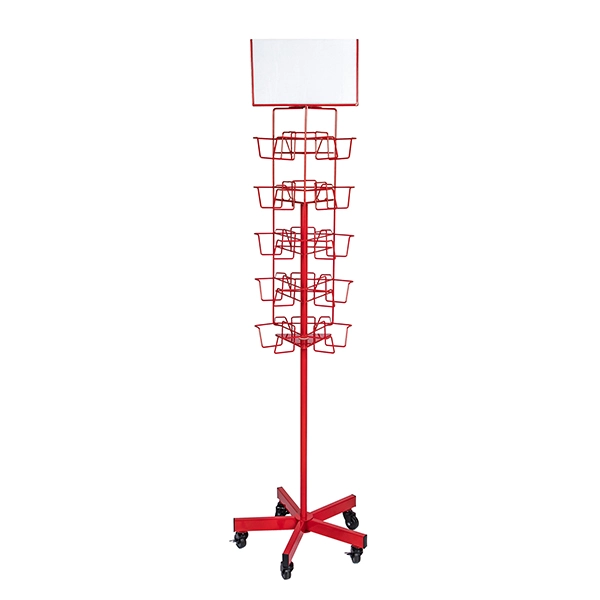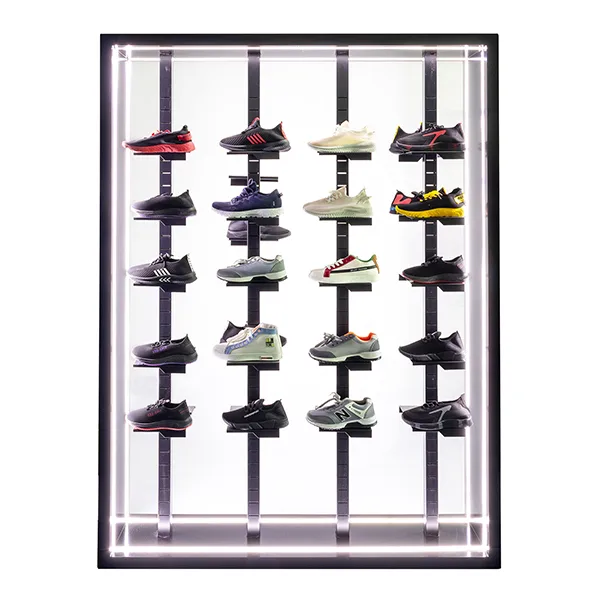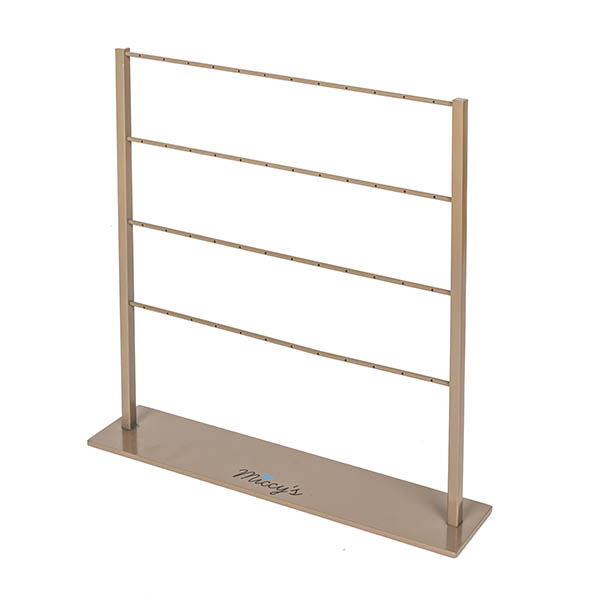¿Cómo elegir un expositor adecuado en función del material de las baldosas?
Are you in the business of selling tiles and struggling to find the perfect display stand to showcase your tile products effectively? One of the critical factors in selecting the right display stand is considering the material of your tiles. Each type of tile material has its own unique characteristics, requiring a display stand that complements its features. Let's delve into how you can choose a suitable display stand based on the material of your tiles.
Understanding Your Tile Material
Before selecting a display stand, it's essential to understand the characteristics of the tile material you are working with. Each material has its own weight, texture, and aesthetic appeal. In this blog, we will take the 5 more mainstream tile materials on the market as examples to discuss which material to choose for the display rack.
1. Ceramic Tiles
Ceramic tiles are the most common type of tiles, made from clay and other natural materials processed and then fired at high temperatures. They are typically coated with glaze on the surface to enhance aesthetics and durability. With their versatility, durability, and various finishes, ceramic tiles are a staple in both residential and commercial spaces.
2. Porcelain Tiles
Porcelain tiles are dense, hard tiles, their density and strength make them resistant to wear and tear, and relatively easy to clean. Porcelain tiles, prized for their strength and low maintenance, are commonly used in highly trafficked areas such as commercial spaces and public buildings, as well as family spaces like kitchens and bathrooms.
3. Quartz Tiles
Quartz tiles are composite materials made of quartz crystals mixed with resin and formed under high pressure and temperature. They are highly resistant to abrasion, scratch-resistant, and offer benefits such as stain resistance and easy cleaning. They are gaining popularity in both residential and commercial applications
4. Glazed Tiles
Glazed tiles are porcelain tiles produced at high temperatures to give them a glass-like glossy surface. They are not only aesthetically pleasing but also offer some degree of slip resistance. With their glossy finish and vibrant colors, glazed tiles add a touch of flair to any space.
5. Marble Tiles
Marble tiles are tiles cut from natural marble blocks, showcasing unique beauty due to the natural stone's texture and color variations. However, marble tiles tend to be relatively expensive and require additional maintenance. Marble tiles, revered for their timeless beauty and natural veining, lend an air of luxury to any environment.
Key Considerations
1. Scratch Resistance: Ensure that the display stand material won't scratch the surface of your tiles.
When choosing a display stand for your tiles, it's crucial to prioritize scratch resistance to safeguard the pristine surface of your tile products. Tiles, especially those with glazed or polished finishes, are susceptible to scratches from abrasive materials or rough surfaces. Opting for a display stand material that is gentle on the tile surface can prevent unsightly scratches and preserve the visual integrity of your tile products. Consider materials like wood or coated metals that offer smooth surfaces and protective finishes to minimize the risk of scratches, ensuring that your tiles remain flawless and appealing to customers.
2. Weight-Bearing Capacity: Select a display stand that can support the weight of your tiles securely.
Another vital consideration when selecting a display stand material is its weight-bearing capacity. Tiles come in various sizes and weights, from lightweight ceramic tiles to heavier marble or quartz tiles. Therefore, it's essential to choose a display stand that can securely support the weight of your tiles without risk of collapse or instability. Metal display stands, particularly those constructed from sturdy materials like (stainless) steel or aluminum, often offer excellent weight-bearing capacity, providing solid support for even the heaviest tiles. Additionally, consider the design and construction of the display stand, ensuring that it distributes weight evenly and includes reinforcement where necessary to prevent sagging or bending under load.
3. Budget: Consider the cost-effectiveness of the display stand material, balancing quality and affordability.
As with any business decision, budget considerations play a significant role in selecting a display stand material. While it's essential to prioritize quality and durability to ensure a long-lasting investment, finding a balance between quality and affordability is key. Evaluate the cost-effectiveness of different display stand materials, considering factors such as initial purchase price, maintenance requirements, and lifespan. Wooden display stands are often a cost-effective option. On the other hand, metal display stands, while typically more expensive upfront, may offer greater durability and longevity, potentially reducing long-term maintenance and replacement costs. Ultimately, weigh the upfront investment against the expected lifespan and performance of the display stand material to make an informed decision that aligns with your budgetary constraints and business goals.
Choosing the Right Display Stand Material
- Ceramic tiles. Ceramic tiles are made from clay and other natural materials processed and then fired at high temperatures, at last coated with glaze on the surface. Ceramic tiles are relatively lightweight, and to protect their glaze, the wooden display stand is the best choice, cause wooden stands won't scratch the surface of the tiles. Additionally, wooden display stands are cost-effective, suitable for showcasing lightweight ceramic tiles, and can provide a warm display environment.
- Quartz tiles. Quartz tiles are composite materials made of quartz crystals mixed with resin and formed under high pressure and temperature. Because of its low cost, we recommend choosing the same economical wooden display rack. Although quartz tiles are relatively heavy, wooden display stands are cost-effective and their structure is relatively stable in the short term. Moreover, wooden display stands can provide a natural, warm display environment for quartz tiles, complementing their modern aesthetic.
- Marble tiles. Marble tiles are hewn from natural marble blocks, and boast considerable weight, revered for their timeless beauty and natural veining, and lend an air of luxury to any environment. Displaying marble tiles requires a solution that complements their opulence and sophistication. Our wooden tile display racks offer sturdy support, with their rich textures and artisanal craftsmanship, providing an elegant backdrop for showcasing marble tiles, and creating a natural, warm display environment for marble tiles. Combined with the luxury of marble tiles, wooden display stands can highlight their high-end quality.

- Porcelain tiles. Porcelain tiles are relatively heavy and require a display stand with high load-bearing capacity. So, when it comes to displaying porcelain tiles, durability is key. The metal tile display racks offer robust support, ensuring that these heavy-duty tiles are presented securely. With sleek and modern designs, the metal racks also provide a contemporary backdrop that highlights the sophistication of porcelain tiles, making them an ideal choice for retail and showroom settings. Metal display stands can ensure stability and durability, suitable for displaying porcelain tiles. To prevent scratching the porcelain tiles, it is best to have a coating on the surface of the metal display rack.
- Glazed tiles. Glazed tiles, known for their smooth surfaces, demand display stands that not only emphasize their shine and vibrancy but also possess a robust load-bearing capacity to enhance any setting with flair. Coated metal display stands offer stability and their sleek surfaces complement the texture of glazed tiles, amplifying the overall display impact. With their reflective surfaces, metal tile display racks serve as ideal platforms for showcasing the beauty of glazed tiles.

Conclusión
Choosing the right display stand based on the material of your tiles is crucial for presenting your products in the best light. Whether it's the warmth of wood or the sleekness of metal, selecting a suitable display stand enhances the visual appeal of your tiles and attracts potential customers to your retail store or showroom. By understanding the characteristics of your tile material and considering key factors such as scratch resistance, weight-bearing capacity, and budget, you can make an informed decision and create stunning displays that showcase the beauty of your tiles effectively.
Entradas relacionadas
Encuentre el fabricante de expositores adecuado desde diferentes puntos de partida
Análisis de diversos procesos de tratamiento de superficies
¿Qué materiales son los mejores para los expositores PLV personalizados?





